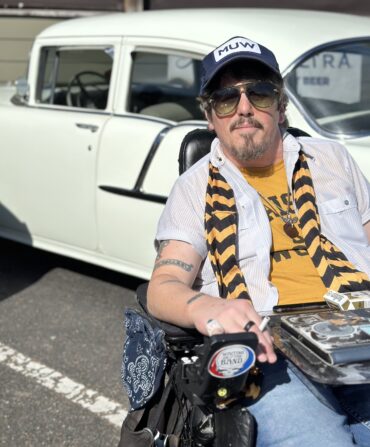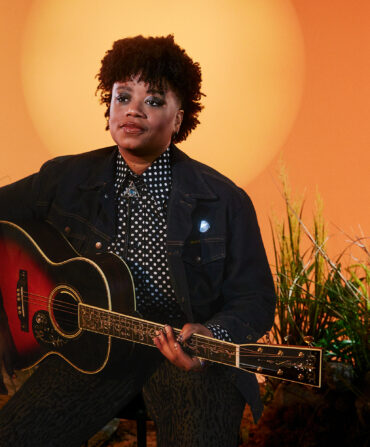Curtis Harding is not new to the microphone. The 39-year-old Atlanta singer-songwriter started performing with his mother, gospel singer Dorothy Harding, at an early age, and his distinctive falsetto has provided the back-up vocals for big hits by CeeLo Green. But lately, Harding’s the one singing lead. His 2017 full-length Face Your Fear was one of our favorite albums of the year, balancing ’70s soul with futuristic elements to make a product all his own—a sound Harding has offhandedly referred to as “slop ’n soul.” “Soul is the foundation of what I do,” he explains. “Slop is mixed up from different kinds of leftovers. My music is a mixture of sounds: it flows, sometimes it’s sloppy, but it still feels good.”
Harding could easily keep riding on Face Your Fear’s breakout success, but he isn’t slowing down. This summer, he’s already released a catchy new single “It’s Not Over” and embarked on an international tour with Lenny Kravitz. We caught up with Harding to talk about the creative process, the timeless appeal of soul music, and how conquering fear can open up possibilities.
Why do you think soul music is so universal?
Whether it’s soul music or it’s country or it’s rock ‘n roll, which is derivative of those things, as long as it’s real, it’s never going to get old. There’s a sentiment in that music that people can relate to. That’s all it is—the realness effect.
You traveled when you were younger, singing and performing with your mother in many different kinds of venues. Did you learn anything from those experiences that you still carry with you today?
Of course. It taught me not to be afraid, not to be inhibited when it came to sharing my gifts and my talents. Meeting new people and hearing different sounds—anything like that helps with your musical development. Any time you’re able to travel and go somewhere, to perform or do whatever, it’s gonna help your musical development.
Your album from last year is titled Face Your Fear. What’s a fear or obstacle you’ve had to overcome?
The music industry is a machine, and if you’re not smart about the choices you make and the people you surround yourself with, you can get caught up in a lot of things that can detract from your talent. So that, in itself, is a huge fear that a lot of artists continue to face on a daily basis. There are also a ton of other things; I mean there is a list of everyday fears that I used to have. When people are afraid, we are easily manipulated. So if you can face those fears—whatever they might be, even if you just might be afraid of heights—you can move forward in your life.
Gospel was a part of the fabric of your life at an early age. Does it continue to inspire what you do?
Gospel is a constant standard, in my life and in my musical catalog. Whether you believe in God or not, there’s a feeling that comes from that style of music. You know that they mean what they say. Sometimes it’s hopeful, sometimes it’s really sad, but whatever emotion they’re trying to transfer, you get it—you feel the energy. That helps me in whatever I do, whatever I sing—just mean it. Don’t get up there and just be singing for the sake of it.
You worked with several musicians in Atlanta before you ever released any of your own material. How has being a collaborator and back-up singer helped you as a solo artist?
To put it simply, in order to be a good leader you have to know how to follow. I did that for a long time, and I still do it any time I’m collaborating with somebody. In order for it to be a good collaboration, you have to know how to follow each other. You have to know when to take the driver’s seat, and you’ve also got to know when to take a step back and let the other person do their thing. I’m always going to be collaborating with as many people as I possibly can, because that’s how you get better. That’s an ongoing musical adventure that every artist I love has taken.
Keep up with Curtis Harding on tour, and be sure to check out his latest album Face Your Fear.








